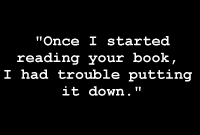

 |
 |
|
|
Blogs – October 2004A few final thoughts before I take a break from blogging and hurl myself head first into National Novel Writing Month... The best way to take on a large and seemingly daunting task is to break it up into small, manageable chunks. Instead of focusing on writing 50,000 words in 30 days, I can look at writing 1,667 words each day. By focusing on the small goals, I can pace myself and steadily reach my target. Another way is to make the effort and not worry about mistakes. When I'm whizzing through getting as many words on the page as I can, I can't worry about typos and imperfect phrasing. I can go back and correct the changes when I have time to focus completely on them. How many times have we been stymied because we feel overwhelmed by the goal we seek or get frustrated by the smallest mistake? If you want to see an example of this, watch that new reality TV show on NBC, The Biggest Loser. That show makes a competition of losing weight, which is the worst possible way to do it. Last week, the contestants felt ashamed that their weight loss was not as great as the previous week, when they lost most of their water weight from starving and over-exercising. One man burst into tears when he gained three pounds. A better approach is to work steadily towards changing behaviors and let the end result take care of itself. See, I've written 278 words in just six minutes! Proof that if you just focus on whatever you seek to do, you can get a lot accomplished in a short time. When I didn't think SPAM could get any lower (if all the cheap knockoff Rolex watches and gray market software weren't low enough), I got an e-mail with the following subject line. (Excuse the language, but I had to show the exact wording so you can get the full effect.)
Now, isn't that nice, professional language from a financial services agency? Doesn't this sound like some place you would entrust with your bank account and Social Security numbers? Proof again that words build our image. Choose the right words to fit the right message. Wipe your mouth, George. I watched the third and final presidential debate (or what is labeled as a debate). There were several things that bothered me about the debate, regardless of the political point of view.
To score President Bush and Senator Kerry solely as debaters, Kerry did a much more effective job. He addressed the moderator and audience more directly. He also did an excellent job parrying the President's attacks. Bush was smart to go after Kerry's record in the Senate, but Kerry was able to answer all of the president's criticisms. President Bush seemed defensive, especially during the first part of the debate. His kept his mouth cocked in a strange angle. His voice was loud and shrill. And if he is going up against a technocrat like Kerry, he should be able to deliver enough facts and figures to keep up. He shouldn't leave it to the bloggers to refute the details Kerry gives. But does being a good debater make a good president? Some of our greatest presidents were mediocre speakers. Debates can help us evaluate the merits of each candidate, but we need to look at each candidate's track record and proposals – as well as our own gut – to determine who we believe should run our country. I was the test speaker at the Area G-3 evaluation contest on Friday night. I've always enjoyed performing this role. Where else can you give a speech in front of a large crowd and have five people work to give you the best possible evaluation? As the contestants gave me their feedback, I took copious notes. I later reviewed them, and I noted the comments they made the most often and were the most useful. Here are some of them:
I got some great feedback from all of the evaluators, and I especially congratulate winner Mark Risner and runner-up Ann Bush. If you want to see more great evaluation contests, contact your local Toastmasters district. If you are in Orange or eastern Los Angeles Counties, visit the Founders District Web site for upcoming contests. More info Related TopicsPrevious Blogs |
| |
|
|
|||